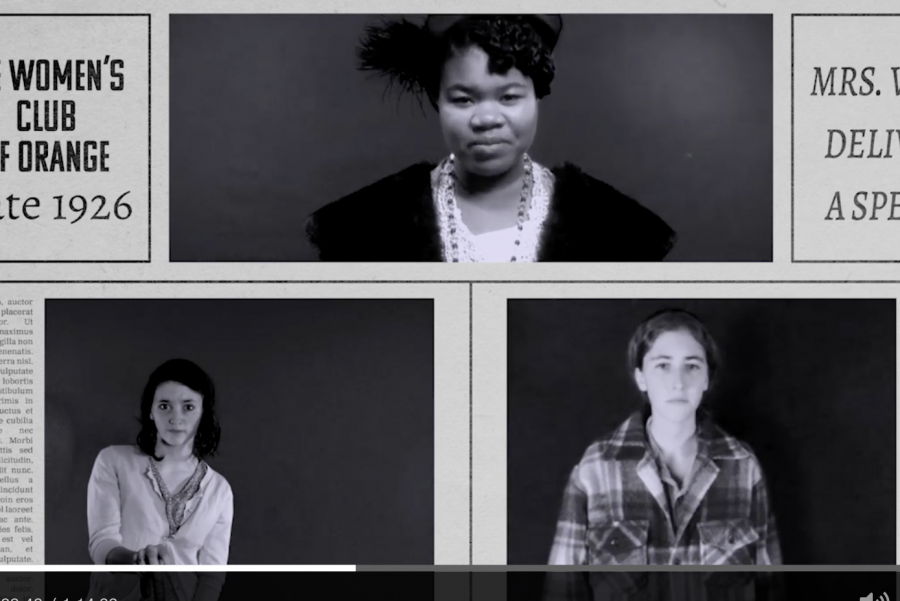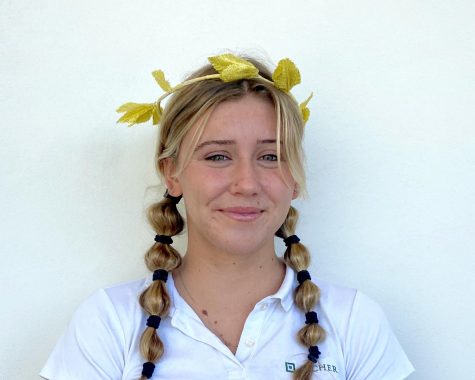‘Radium Girls’: Fighting for rights amidst a pandemic
Photo credit: Tracy Poverstein
Pictured is a scene from the first showing of the upper school play entitled “Radium Girls.” Justine Moore ’22, Bess Frierson ’22 and Ruby Horton ’21 are shown on a pre-recording stream on Vimeo.
December 6, 2020
A story of young women fighting for their rights and reparations in the 1920s. A story of unsuspecting women taking on the job of painting watches, as the radium paint they ingest poisons their bodies. This is the story of the radium girls. On Nov. 13 and 14, the upper school play entitled “Radium Girls” streamed a black and white and CGI-enhanced film of the play via Vimeo.
After it was clear that the upper school play would have to be done remotely due to COVID-19, arts teacher Tracy Poverstein and Director of Fine and Performing Arts Reed Farley looked into available plays that allowed streaming. Poverstein had considered doing the play in previous years, and felt the story’s message was fitting for the challenges people are facing in the remote world.
“[‘Radium Girls’] was really a story about fighting for justice, and it seemed during these times that I thought people could relate to that. It would take a fight for justice in a different time period, but I like the idea of of young women being strong and rising up against big corporations and not giving up,” Poverstein said. “Especially since we’re all having difficult times in this remote world and a lot of change around us so I wanted something that could speak to people.”
Casting for the play was done via Zoom auditions, noting how students were able to work in front of a small audience. According to Poverstein, the same amount of students auditioned this year with the knowledge that the play would be remote,
“It was definitely a mix of emotions because I think everyone was pretty intrigued as to what it was going to turn out as. I was just really interested and excited as well to see how it would turn out,” cast member and sophomore Azel Alkadiri said. “I know that Ms. Pov is so good at putting on productions and she’s so smart in that way that I knew that it would turn out cool whether it was virtual or in person.”
Fellow actress and junior Bess Frierson played the lead role of Grace Fryer in the Friday 13 showing. Frierson had perviously taken part in a pre-college summer acting intensive on Zoom, and found acting on zoom to be “fun” and that it worked better with her schedule.
“I actually really liked acting on zoom, I thought it was kind of fun and it was almost like a film,” Frierson said. “So, I personally was pretty excited because I thought, ‘Oh, it’ll be different and also, it works much better with my schedule because it’s only 30 minutes instead of two hours of commute.'”
Poverstein and Reed tested out different formats for the final production, initially planning on having the play be live on Zoom, but they found that wifi issues would be too big an issue. The final stream used pre-recorded scenes, using green screens so that the film was turned black and white and superimposed onto the picture spaces of a newspaper, with the headings introducing the scenes and characters.
“It was basically every aspect of being a play is eliminated because you’re not doing it live, I set up like a green screen in my dining room that was pre recorded it’s like you’re not actually interacting with people so it was super weird, but it was still interesting just because it felt more like a production like TV it felt like you were filming,” Alkadiri said.
Acting in plays relies on interaction, physical touch and dialogue between the cast members, aspects which were altered when done remotely. The actors practiced their scenes on zoom, working on looking at one another though there were delays in zoom video and audio.
“I think it’s a good lesson that I hope the students will look back on this, and remember that they did something that was considered too hard or too difficult. They created something new that wasn’t film, that wasn’t theater, but it was like this new hybrid,” Poverstein said, “I hope that you know they have a feeling when they come up with challenges in life that they’ll feel like, ‘oh, I’ve done things that are too difficult in really hard times and I can push through this next challenge and make something new out of that too.'”
Rehearsals were set up four days a week, and cast members would receive a list notifying them whether they would be working or filming that day. The change in rehearsal format meant that cast members only saw the people in their own scenes, but previous theatre friendships helped create a “bonding experience” and “love”.
“It felt like there was still the love there, especially for anyone who’s been in theater more than a year, we were already friends and we already knew each other and we already had an understanding of like the atmosphere,” Frierson said, “It was also fun to be with everyone and I think it was also a bonding experience.”
Poverstein and Farley tried out different possible streaming and filming formats and their final decision to record and stream the play meant that two weeks of rehearsals were cut for post-production work. The actors had to learn their lines quicker and learn how to use the green screens, microphones and lights for filming, but it was “rewarding” to see the final result.
“Tt was just it was hard at some points and it definitely made me feel sad some days that we weren’t in person,” Alkadiri said, “I think it was feelings of pride and happiness for the cast and the director and it was really rewarding experience.”










Tracy Poverstein • Dec 7, 2020 at 9:31 am
Hi Thea, thank you for highlighting the arts!